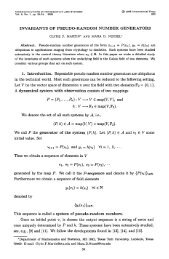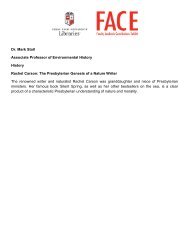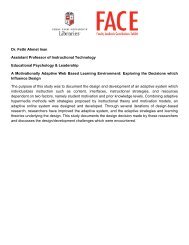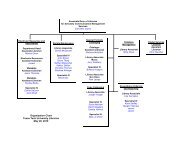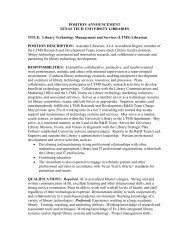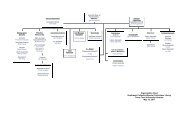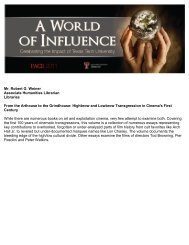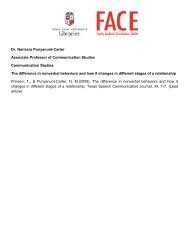Nonprofit Organizations Law and Policy Third Edition - Libraries ...
Nonprofit Organizations Law and Policy Third Edition - Libraries ...
Nonprofit Organizations Law and Policy Third Edition - Libraries ...
Create successful ePaper yourself
Turn your PDF publications into a flip-book with our unique Google optimized e-Paper software.
SEC. IV FOREIGN NONPROFIT ORGANIZATIONS 57<br />
Most foundations are subject to corporate income tax pursuant to the<br />
same conditions as commercial enterprises. However, those foundations<br />
which carry out their activity free of charge (i. e., they have no income) or<br />
those whose expenses exceed income are exempt from corporate tax.<br />
With regard to the value added tax ("VAT"), as is the case for<br />
associations, this tax may apply to certain activities of certain types of<br />
foundations.<br />
Foundations which are exempt from VAT are those the purpose of<br />
which is charitable or philanthropic, <strong>and</strong> only provided that the prices<br />
which they charge have been approved by the public authorities, or if the<br />
prices are below market prices for comparable services, or if the services<br />
performed by the foundation are not available by commercial enterprises.<br />
Finally, like associations, payments which are made by individuals to<br />
a public interest foundation are deductible from taxable income within<br />
certain limits which are set by the Tax <strong>Law</strong> enacted each year by the<br />
legislature.<br />
B. SYNOPSIS OF ITALIAN LAW ON<br />
NONPROFIT ORGANIZATIONS<br />
Professor Giovanni Riccio 26 summarized laws in Italy on nonprofit<br />
organizations as follows. Italy reorganized the fiscal legal principles of<br />
nonprofit organizations in 1997. 27 The 1997 law created ONLUS (Organizzazione<br />
non lucrativa di utilita or Non-profit organization of social utility),<br />
which is a nonprofit organization with social benefit purposes. These<br />
separate <strong>and</strong> autonomous category of entities have fiscal benefits in that<br />
they may receive donations from the state. Further, individuals <strong>and</strong><br />
companies receive tax deductions for their donations. Donations to the<br />
ONLUS foundations are deductible up to a certain percentage of gross tax,<br />
<strong>and</strong> the transfer of goods as gifts to ONLUS is VAT exempt. Activities of<br />
ONLUS center around benefitting persons disadvantaged by economic,<br />
physical, mental, social or family conditions <strong>and</strong> include providing humanitarian<br />
aid to members of foreign groups. These corporate bodies may not<br />
distribute their profits to members or other entities nor may they distribute<br />
assets to their members upon dissolution (the non-distribution constraint<br />
principle).<br />
The Italian Civil code recognizes two forms of nonprofit organizations:<br />
associations <strong>and</strong> foundations. Associations <strong>and</strong> foundations are set<br />
up by a public document, by a notarial act, or by another public official,<br />
but foundations, unlike associations, may be created by will. The law<br />
relating to associations <strong>and</strong> foundations is similar to that in the United<br />
States in many respects. These organizations have private autonomy <strong>and</strong>,<br />
in effect, become corporations by filing a memor<strong>and</strong>um of association that<br />
26. Professor Giovanni Maria Riccio, Professor of <strong>Law</strong>, University of Salerno Otaly); translated<br />
by Ileana Ippolito <strong>and</strong> Frank Z. Elmer.<br />
27. Legislative Decree 460.



